Book contents
- Frontmatter
- Contents
- List of contributors
- Preface
- Glossary
- 1 The structure and production of blood platelets
- 2 Platelet immunology: structure, functions, and polymorphisms of membrane glycoproteins
- 3 Mechanisms of platelet activation
- 4 Platelet priming
- 5 Platelets and coagulation
- 6 Vessel wall-derived substances affecting platelets
- 7 Platelet–leukocyte–endothelium cross talk
- 8 Laboratory investigation of platelets
- 9 Clinical approach to the bleeding patient
- 10 Thrombocytopenia
- 11 Reactive and clonal thrombocytosis
- 12 Congenital disorders of platelet function
- 13 Acquired disorders of platelet function
- 14 Platelet transfusion therapy
- 15 Clinical approach to the patient with thrombosis
- 16 Pathophysiology of arterial thrombosis
- 17 Platelets and atherosclerosis
- 18 Platelets in other thrombotic conditions
- 19 Platelets in respiratory disorders and inflammatory conditions
- 20 Platelet pharmacology
- 21 Antiplatelet therapy versus other antithrombotic strategies
- 22 Laboratory monitoring of antiplatelet therapy
- 23 Antiplatelet therapies in cardiology
- 24 Antithrombotic therapy in cerebrovascular disease
- 25 Antiplatelet treatment in peripheral arterial disease
- 26 Antiplatelet treatment of venous thromboembolism
- Index
22 - Laboratory monitoring of antiplatelet therapy
Published online by Cambridge University Press: 15 October 2009
- Frontmatter
- Contents
- List of contributors
- Preface
- Glossary
- 1 The structure and production of blood platelets
- 2 Platelet immunology: structure, functions, and polymorphisms of membrane glycoproteins
- 3 Mechanisms of platelet activation
- 4 Platelet priming
- 5 Platelets and coagulation
- 6 Vessel wall-derived substances affecting platelets
- 7 Platelet–leukocyte–endothelium cross talk
- 8 Laboratory investigation of platelets
- 9 Clinical approach to the bleeding patient
- 10 Thrombocytopenia
- 11 Reactive and clonal thrombocytosis
- 12 Congenital disorders of platelet function
- 13 Acquired disorders of platelet function
- 14 Platelet transfusion therapy
- 15 Clinical approach to the patient with thrombosis
- 16 Pathophysiology of arterial thrombosis
- 17 Platelets and atherosclerosis
- 18 Platelets in other thrombotic conditions
- 19 Platelets in respiratory disorders and inflammatory conditions
- 20 Platelet pharmacology
- 21 Antiplatelet therapy versus other antithrombotic strategies
- 22 Laboratory monitoring of antiplatelet therapy
- 23 Antiplatelet therapies in cardiology
- 24 Antithrombotic therapy in cerebrovascular disease
- 25 Antiplatelet treatment in peripheral arterial disease
- 26 Antiplatelet treatment of venous thromboembolism
- Index
Summary
INTRODUCTION
As platelets are clearly involved in the pathology of atherosclerosis and arterial thrombosis (Chapters 16 and 17), antiplatelet therapy forms an important component of both treatment and prophylactic strategies (Chapter 21) in high-risk patients with cardiac (Chapter 23), cerebrovascular (Chapter 24), or peripheral vascular disease (Chapter 25). Antiplatelet drugs are also occasionally used as prophylaxis for venous thromboembolism, although anticoagulants are more effective in the venous circulation (Chapter 26). Many types of established and new platelet function tests (Chapter 8) are being investigated to see if they predict those at risk of arterial disease and also for monitoring antiplatelet drugs being given for secondary prevention. In particular, there has been a recent explosion of interest in detecting patients who respond poorly to their antiplatelet therapy, with widespread use of the misleading and poorly defined terms “aspirin resistance” and “clopidogrel resistance.” Although the repertoire of antiplatelet drugs that are now available for clinical use is also likely to increase in the future (Chapter 20), platelet function testing is still not widely used to detect, monitor, or titrate different types of antiplatelet therapy in different patient groups in different clinical settings. The question also remains whether platelet function tests can identify a clinically important “resistance” to aspirin and/or clopidogrel, and if so, how treatment should be modified.
- Type
- Chapter
- Information
- Platelets in Hematologic and Cardiovascular DisordersA Clinical Handbook, pp. 386 - 406Publisher: Cambridge University PressPrint publication year: 2007
- 1
- Cited by



